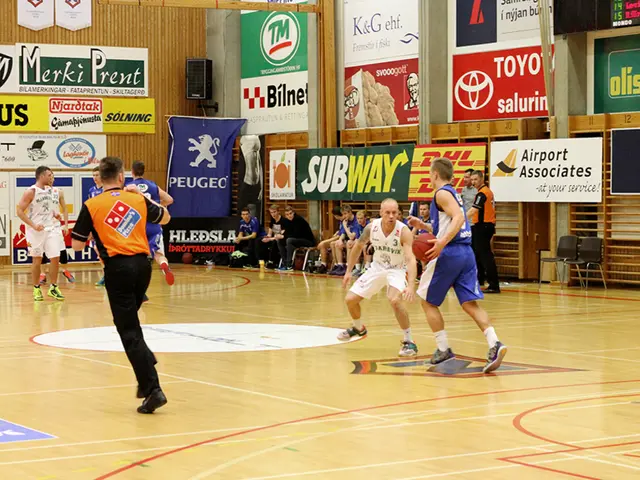Slacking German Industry: Tackling Challenges Heads On
Year of decisive actions or choices
Kicking the can down the road has been a tradition in the German industry, a practice that's becoming unsustainable in the intensified competition.
By Heidi Rohde
For German companies, especially the leading industries in the automotive and chemical sectors, as well as steel, 2024 was a tumultuous year - mattered with negativity. Sales and profits, employment, and overall competitiveness have all taken a hit for top corporations and numerous, not all, large and small medium-sized companies. As a result, there wasn't a shortage of grim headlines. Companies are tightening their financial belts, aiming to slim down and relocate production overseas, as domestic conditions are heavily criticized. Bureaucracy, labor, and energy costs are the perennial complaints shared among industries. The common thread in the wretched narrative is that companies often point the finger at the state, while evading their own responsibility in the situation.
Stepping on the Gas Pedal
Sadly, German traditional corporations don't give the impression of displaying a particularly responsible approach to the financial difficulties plaguing the economy in the new year. Both the crisis-ridden steelmaker Thyssenkrupp and the automotive icon VW provide a disappointing example to behold. The steel producer faces severe financial costs and fierce competitiveness in the volatile steel market, not just since the latest economic downturn in demand. It's a similar story for VW, faced with an acute demand slump on the German and European electric vehicle (EV) market, exposing the company's longstanding weaknesses.
Squandered Opportunities
This disappointment is no surprise when one delves deeper and discovers a pattern of procrastination embedded in German industries over the years: as operational distress intensifies, the board raises the alarm, followed by a public showdown with the workforce, and ultimately a questionable compromise, heavy on promises - a future concept or pact - yet pinched by big numbers representing necessary cuts. Implementation often stumbles: the spin-off of the steel division at Thyssenkrupp, which jeopardizes the company's existence, has been dragging on for years, as has a voluntary job cut at VW, repeatedly attempted.
Crisis in Social Partnership
These examples highlight the German social partnership reaching its breaking point under the weight of the industry's current challenges. As long as market downturns in an industry were primarily cyclic, face-saving savings could be negotiated - for a temporary dip, which allowed German companies to make up cost disadvantages in competition through technically superior products in a recovering global economy. However, the situation has changed: geopolitical tensions ignite trade wars and halt the globalizing economy. Donald Trump's administration's new tariffs add to the challenges German companies face. In addition, the competitive environment has shifted significantly, particularly in the automotive and machinery sectors, which have lost their technological edge. Chinese competitors present a remarkably aggressive challenge in EV technology, semiconductors, and battery cells.
Time Is Running Out
The German industry as a whole has no time to waste in addressing these profound concerns. Stakeholders in companies must adapt to create innovative and agile strategies that cater to changing markets and competition. 2025 is a year of reckoning, not just for the German government but for German companies as well.
Enrichment Data:
Overall:The German industry, especially the automotive and steel sectors, faces colossal challenges, such as global trade disputes, technological transitions, and intensified market competition. Here's an analysis of these challenges and corporate responses:
Key Challenges1. U.S. Tariffs and Trade Tensions - Automotive: Donald Trump's 25% tariffs on EU car exports threaten €67bn in trade, causing expected global production cuts of 1.5–5 million vehicles in 2025. These tariffs could disrupt supply chains, raise prices, and reduce demand [1]. - Steel: Although not explicitly stated, steel sectors likely face similar pressures from trade tensions, as retaliatory tariffs often target industrial goods.
- Chinese Market Competition German automakers like Volkswagen and Mercedes face heavy competition from local Chinese manufacturers like BYD, who dominate the Chinese market thanks to a shift in consumer preferences towards EVs and local brands [2]. A proliferation of Chinese brands at key events like the Shanghai Auto Show illustrates this trend [2].
- EU Regulatory Pressures The EU’s planned ban on combustion engines in 2035 risks destabilizing suppliers reliant on traditional components (e.g., Mahle, a key supplier for German auto manufacturers Thyssenkrupp). This move conflicts with the continued global demand for combustion engines in markets made less competitive by tariffs [4].
Corporate Responses
Automotive Sector: Volkswagen (VW)
- Supply Chain Adjustments: VW faces pressure to relocate production to avoid US tariffs, but specific plans are not detailed.
- EV Transition: Focusing on electric vehicle models to align with EU regulations. However, trade barriers complicate worldwide competitiveness [3][4].
- Stock Market Impact: VW shares took a hit, dropping 6–8%, following Trump’s tariff announcement, reflecting investors' concerns about the company's profitability [1].
Steel Sector: Thyssenkrupp (Inferred)
- Regulatory Advocacy: Suppliers like Mahle appeal for delays to the EU’s combustion engine ban to protect jobs and revenue [4]. Thyssenkrupp, a significant steel supplier, likely supports similar lobbying efforts.
- Diversification: Exploring green steel initiatives to align with EU climate goals, but trade barriers might constrain export-oriented strategies.
OutlookGerman manufacturers face a hybrid storm of protectionist policies, technological disruption, and lopsided market access. While automakers prioritize EV development and regional production strategies, steel-dependent industries are poised to make tough trade-offs between regulatory compliance and global trends. Without relief from tariffs and delays in regulations, both sectors risk prolonged instability [1][2][4].
- The steel producer Thyssenkrupp, despite facing financial challenges and fierce competition in the global steel market, has announced surprising plans to delve into the sports industry, aiming to diversify its portfolio by 2025.
- In a surprising move, Thyssenkrupp also unveiled a promising industrial collaboration with German sports equipment manufacturer Puma, aiming to develop innovative materials for sports products that could potentially revolutionize the sports industry.
- Amidst industrial setbacks, the unexpected partnership between Thyssenkrupp and Puma could provide a silver lining for the German economy, showcasing the potential for unexpected success in 2025 and affirming the resilience of German industry in tackling challenges head-on.








